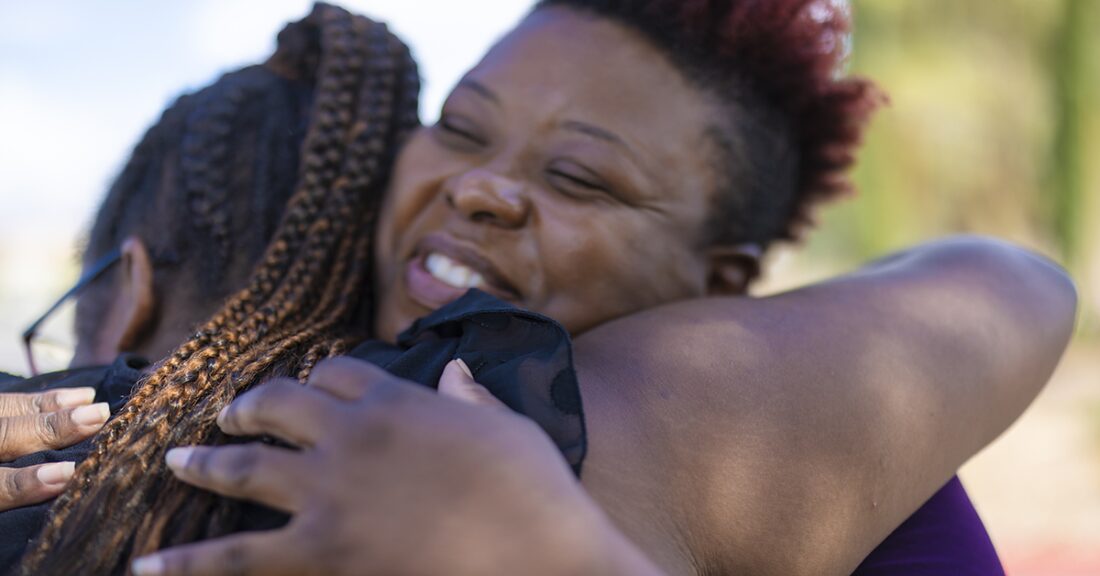Parents Helping Parents Achieve Stability in Georgia

Together with Families, a program funded by the Annie E. Casey Foundation, achieved remarkable results in its pilot program for families experiencing homelessness in Cobb County, Georgia. Recently, the program graduated its first class, with all six families moving into stable housing.
Federal data show that in 2022, 47% of entries to Georgia’s foster care system were related to neglect. Referred by the Cobb County School District, families in the pilot received crucial support to secure basic needs like transportation, employment opportunities and education. Several parents even received donated cars or car repairs to ensure reliable transportation.
Children were able to stay in their schools, experiencing improved attendance and academic performance. Most importantly, these families remained together, avoiding the trauma of entering the child welfare system.
“Together with Families is empowering parents, who know best what they need, to be part of building solutions that keep families together and thriving,” said Felicia Kellum, a senior associate with the Foundation’s Family Well-Being Strategy Group. “We are eager to help other organizations learn from this innovative approach so more families can overcome the poverty-related challenges that too often result in family separation.”
Empowering Families, Building a Foundation for Stability
The program identified families experiencing housing insecurity through referrals from the Cobb County School District. Together with Families provided targeted support to address core challenges on their path to stability. Key areas of focus included:
- Safe and Secure Housing: The program offered assistance with navigating housing programs; overcoming barriers to securing rentals, such as eviction history or lack of rental history; and even securing rental deposits and credit repair assistance.
- Reliable Transportation: Many families received critical support with car repairs, down payments for vehicles, or access to rideshare services. This ensured consistent transportation to work and school, promoting long-term stability.
- Employment Opportunities: Parents were connected to job training, resume building workshops and interview coaching. This equipped them with the skills and resources to secure better jobs and improve their financial situation.
The Power of Peer Support
The pilot went beyond simply providing resources. Together with Families fosters genuine connections through its parent ally component. These allies, themselves with past experiences in poverty or the child welfare system, receive comprehensive training to support families by:
- Offering Peer Support: Monthly meetings and one-on-one interactions provide emotional encouragement and a sense of community for families facing similar challenges.
- Identifying Needs and Goals: Working collaboratively with families, allies help them define their specific needs and goals.
- Building a Support Network: The program connects families with valuable community resources, fostering long-term stability and a sense of empowerment.
“When you’re at risk of entering the child welfare system you can easily feel like you’re not a good enough parent,” said Johnette Hill, a former program participant and current executive advisor and parent ally. “With encouragement and connections, I’ve built up my credit and recently purchased a home for my family,” Hill shared. “Now I get to give back the same help I received during a very stressful and soul-baring time by being an ally.”
Breaking Cycles, Strengthening Communities
Together with Families was designed with the input of young people and parents who have experienced poverty or the child welfare system. The initiative leverages in-kind donations to maximize its impact, allowing it to help 98% of referred families avoid the trauma of separation. This proactive approach is further bolstered by the shift to school-based referrals, which allows for intervention before families reach contact with systems.
“When you don’t have somebody to fall back on, life can be extremely hard,” said Sarah Winograd, co-founder and co-executive director of Together with Families. “Our solutions illustrate the value of serving as a navigator for families unaware of how to access the resources available to them. System involvement is often unnecessary when we can address these issues within the community.”
Previously working with referrals from Georgia’s child welfare agency, Together with Families has already supported over 180 families. Looking ahead, it plans to implement the following strategies:
- Expanding the Parent Ally Program: Engaging past graduates as allies strengthens the program’s impact by providing ongoing support and creating a more robust network of mentors.
- Raising Awareness: Community education campaigns will reduce the stigma around seeking help and make families aware of available resources. This will empower them to proactively address challenges and promote self-sufficiency.
- Informing Policy: Data collected from the program will be used to advocate for state and local child welfare policies that strengthen families and reduce neglect-related foster care entries.
With continued support from the Foundation, Together with Families is poised to empower even more families, with a new cohort starting in August 2024. Its innovative approach demonstrates the power of community support in keeping families together and building a foundation for stability.
Learn more about how communities can prevent families from having child welfare involvement






